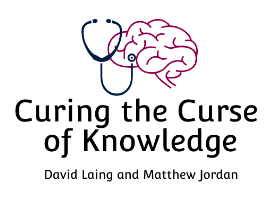Lesson 1: The Curse
Hello and welcome to the first lesson in Curing the Curse of Knowledge! Our goal today is to convince you that the Curse of Knowledge is a real and pervasive problem, and a major cause of bad writing.
You have undoubtedly encountered confusing explanations. You’ve dozed off in jargon-filled lectures, muddled through dense textbook chapters, and squinted at incomprehensible furniture assembly instructions. But in many of these cases, you eventually understood the material. Something clicked in your mind, and it all became clear. Thinking back on how it was initially presented to you, you probably wondered, “why did they explain it like that?”
No, seriously—why?
This question becomes even more puzzling when you realize that the writers and speakers who left you mystified probably endured equally confusing explanations when they themselves were learning. And yet, even after they saw the light, they turned right around and confused you. Why is it so hard for experts to explain things clearly to the people who most need them explained?
The reason is the Curse of Knowledge. When you know something, it’s practically impossible to imagine what it would be like not to know it.
It’s hard to get a feel for the Curse of Knowledge from the inside—that’s the whole point—but here is an experiment you can try. Think of a well-known song, like Twinkle Twinkle Little Star, Hey Jude, or Shake It Off. Now go find a friend, or anyone who will indulge, and see if they can guess the song just from hearing you clap its melody.
Really, go try it! (No humming, by the way.)
*
*
*
If this went as we expect it did, your interlocutor failed to guess the song. One of us (David) has run this experiment in classes with hundreds of students, and he has found that it’s rare for even a single listener to guess correctly. Doesn’t it feel strange to clap along to a song that sounds so clear in your head, while your listener stares blankly and shrugs their shoulders? This is the Curse of Knowledge in action: you can hear the music in your head, but all they can hear is a disconnected, rhythmic skeleton.
Clapping a song is not so different from writing. With the clapping exercise, you’re taking melody, harmony, timbre, lyrics, and all the other myriad elements that make up music, and reducing them down to a single dimension. Similarly, when you write, you’re eliminating all of the elements of speech—body language, intonation, subtle facial cues, and instant feedback—then trying to convey a tangled web of ideas through nothing more than a series of squiggles on a page, strung out in a line. No wonder writing well is a high-wire miracle; it’s replacing a full orchestra with a lone percussionist.
What can be done? Well, there is good news and bad news.
The bad news is that the Curse of Knowledge can’t really be cured. Sorry, ‘Curing the Curse’ sounded cool. Sue us. If you want to write well, prepare yourself to wrestle with the Curse of Knowledge till the end of your days. Not only that, but the curse will get stronger the more you learn. The more expert you become, the harder you will have to work to share your knowledge with others who haven’t gone as far down the same path.
The good news is that the Curse of Knowledge can be managed, and this will make all the difference in your craft as a writer. The key to managing the Curse is to adopt a reader-centered approach to writing, which will be the theme of next week’s lesson. In subsequent weeks, we will show you how to:
- Write more effective explanations by putting examples first.
- Adopt a conversational, visual style that draws readers in without dumbing anything down.
- Give and receive more useful feedback during the editing process.
Make no mistake: the Curse of Knowledge is not the only cause of bad writing. Writers often use needlessly fancy words to hide the fact that they have nothing to say. We have all seen—and perhaps even written—lines on a résumé like “utilized novel methodologies to achieve exemplary results.” Yuck.
That said, we believe that pretentiousness and obfuscation don’t explain most of the bad writing in the world. You may have heard of Hanlon’s razor: “Never attribute to malice that which is adequately explained by stupidity”. To apply this insight to writing: most of us are trying our best to write clearly, but our knowledge makes us stupid.
Try to become more attuned to how the Curse of Knowledge has influenced the writing around you. When reading things we find confusing, we often throw up our hands and say “I guess I don’t know enough to understand this”. Over the next week, resist that temptation, and really ask yourself: why is this confusing? How would I have written this? What does this author assume I know, and is that assumption reasonable?
If you’re feeling brave, find an old piece of your own writing, something you worked hard on but can’t remember in much detail. Read it carefully, and pay special attention to the sections where you have to slow down or read a sentence multiple times. Ask yourself: what makes those sections hard to read? Is it that the words are too abstract? Is it that transitional phrases were left out? Is it that key terms were used before they were defined?
We encourage you to jot down some notes as you ponder these questions. The more actively you reflect on writing, the more you will get out of the insights we share over the coming lessons.
